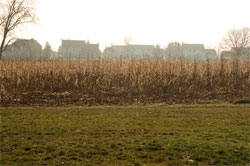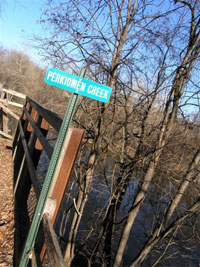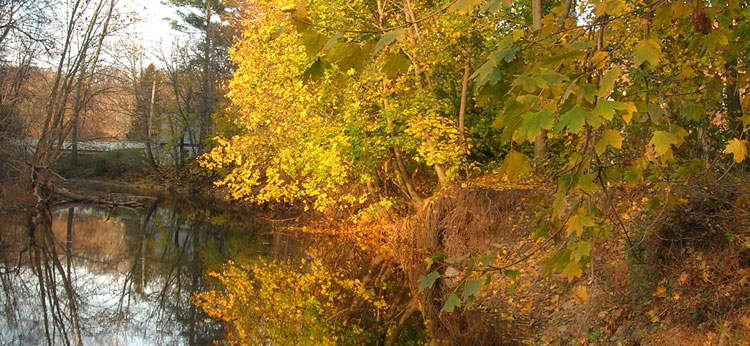 I was the fifth passenger in Earl Anders’ car, crammed into the back seat with two older Mennonite women with coverings, glad that I was offered a ride instead of biking through the dreary day. Most of the drive’s conversation was in the back seat, observing how greatly the landscape has changed since they have last been taken this trip to the area where they grew up. They talked about the tragedy of increased housing prices and decreased number of farms, and how years ago the boys used to shake the bridge across the creek when the girls would walk across. They kept apologizing for the conversation.
I was the fifth passenger in Earl Anders’ car, crammed into the back seat with two older Mennonite women with coverings, glad that I was offered a ride instead of biking through the dreary day. Most of the drive’s conversation was in the back seat, observing how greatly the landscape has changed since they have last been taken this trip to the area where they grew up. They talked about the tragedy of increased housing prices and decreased number of farms, and how years ago the boys used to shake the bridge across the creek when the girls would walk across. They kept apologizing for the conversation.
I was asked to share about Bikemovement at Providence Mennonite Church in Collegeville (PA) for the Maturing Pilgrims monthly luncheon. The afternoon’s adventure began as we pulled into the parking lot of the church, which can only be reached by driving through a housing development. I’m guessing the church was once in the middle of Pennsylvania farmland, but has since been surrounded, almost engulfed by buildings, highways and change.
We shared a pizza and soda luncheon, supplemented with enough home-made desserts to fulfill an entire potluck meal. One woman took a bite of her slice covered with onions, peppers and mushrooms and exclaimed, “I’ve never tasted anything like this before.” I smiled and said it was a great meal. I guessed that I was the only person under 60 in the room.
Following lunch, there was a series of jokes like: Q: What is a Gorilla’s favorite fruit? A: An ape-ricot. Or Q: Why can’t pigs drive cars? Because they don’t have horns? was a proposed answer, but no, it was because they were road hogs. They wondered if I enjoyed the pizza party. Multiple comments were made about how the pizza was an unusual experience at the monthly event.
During the introduction to my presentation, a smoke alarm with a low battery kept chirping on the ceiling in the middle of the room. Ralph, the tall pastor who was introducing my presentation, noted that the battery was on its last leg. Others around the room kept acknowledging the steady chirp,whispering to each other about the noise. Finally Ralph reached up and yanked the thing off the ceiling, hoping to be done with the annoyance and setting it on the table. He proceeded to report on a person from the group who is in the hospital due to a heart attack as the group entered a time of prayer. The smoke detector chirped again. A man at one of the tables started pulling it apart to get the battery out, hoping to be done with the distraction. Chirp. The prayer continued, “Dear God, be with these people during this time of trial…” Chirp… As the prayer ended, the device was disassembled and silent.
 I was on. I shared about Bikemovement and our purpose, struggles and dreams. I shared mostly with photos and personal stories. We talked about how many churches are struggling to connect with their young adults, how many are leaving and not returning. They mentioned how the Baptist church next door is always full to the brim on Sunday. We acknowledged that we all have struggles and broken relationships and that the church can be a relevant community to gather and grow together. They shared with me how they used to bike around the area on single speeds to get to school or visit friends. Some said they used to go to church events for the social space, perhaps to meet the girls from the far edge of the conference—Blooming Glen, about 10 miles up the road.
I was on. I shared about Bikemovement and our purpose, struggles and dreams. I shared mostly with photos and personal stories. We talked about how many churches are struggling to connect with their young adults, how many are leaving and not returning. They mentioned how the Baptist church next door is always full to the brim on Sunday. We acknowledged that we all have struggles and broken relationships and that the church can be a relevant community to gather and grow together. They shared with me how they used to bike around the area on single speeds to get to school or visit friends. Some said they used to go to church events for the social space, perhaps to meet the girls from the far edge of the conference—Blooming Glen, about 10 miles up the road.
One woman stated, “Well, we can’t bike with you, but at least we can contribute financially.” They suggested that an offering be taken to give to the MWC AMIGOS fund to bring youth from the global south to Paraguay 2009. They loved being able to joyfully give.
After we formally finished, the conversation and questions continued. One gentleman expressed concern about the future of the church. He said, “when we all are gone, this thing will be done. We try to go into the surrounding development and invite them in, but they don’t seem to care. They just don’t seem to want to come to church.”
We discussed whether we really know what our neighbors want and are passionate about. He said, “I don’t know, but I don’t think they want to come to church.” His friendlycuriosity seemed somewhat frustrated as he searched his mind for answers.
On the way home the women continued to chat and point out the changes. “That house over there, with the boxy room on top, was my aunt’s. We all used to call her Auntie Castle, because of the house. The trolley car used to re-charge in this building there. My brother would take it down to the city when he was in medical school.”
I had never known that a trolley came this far north along the Perkiomen Creek from Philadelphia. Now the suburbs are overrun by an army of SUV drivers, and public transportation has died out. I spend much of my time commuting by bicycle in a land that is always changing.
The Perkiomen trail that I occasionally use to bike to Philadelphia for meetings was once these old trolley tracks. The old trolley car also came into Harleysville, within a half mile of my house. I can only imagine how wonderfully relevant it would be to have that trolley now.
Reactions of novelty, misfortune and hope arose from the many cultural changes that were evidenced in the afternoon’s conversations. It seems that the most significant thought for all of us was to know that there are still some of us who care enough about their struggles with the church, as one older woman put it, to “go on an adventure in faith…and risk something new.”

The opinions expressed in articles posted on Mosaic’s website are those of the author and may not reflect the official policy of Mosaic Conference. Mosaic is a large conference, crossing ethnicities, geographies, generations, theologies, and politics. Each person can only speak for themselves; no one can represent “the conference.” May God give us the grace to hear what the Spirit is speaking to us through people with whom we disagree and the humility and courage to love one another even when those disagreements can’t be bridged.

Thanks, Dave, for this interesting,informative, and insightful report on this visit to Providence. I can imagine the setting, and the people you visited with. How do we bridge such a culture gap? I am inclined to say we “be nice” and not try too hard. But it was good you could entertain these folks for a while and maybe, just maybe, a seed was planted that will germinate that leads to some missional transformation. So glad you are with us,
Jim
Hey Dave. This is good. Keep the conversations going. Both sides need it. I love how you ate pizza. What a symbol to the changing times. We don’t need to sit down and eat meat and potatoes every time, although I wouldn’t say no to that. Keep talking and eating pizza, like we did that one day across the street from FMC. Questions are more important than answers at this point.
Dave,
Thanks for the report and all the work you are doing. You have a special gift for the task at hand.
God bless,
Forrest
Dave: keep up the great work. Significant intergenerational interactions like your sharing time at Providence are what give me faith that the Mennonite Church has a strong future to match it’s rich past. It’s amazing what we learn when we begin to talk with people from other generations. At Zion, our Young Adult and Seniors classes have started meeting jointly on occasion, and both groups are leaving energized. Our older adults served as catalysts to bring about many of the changes that made the Mennonite Church relevant when they were in their young adult years, and they are very supportive of our efforts to carry on that rich tradition.